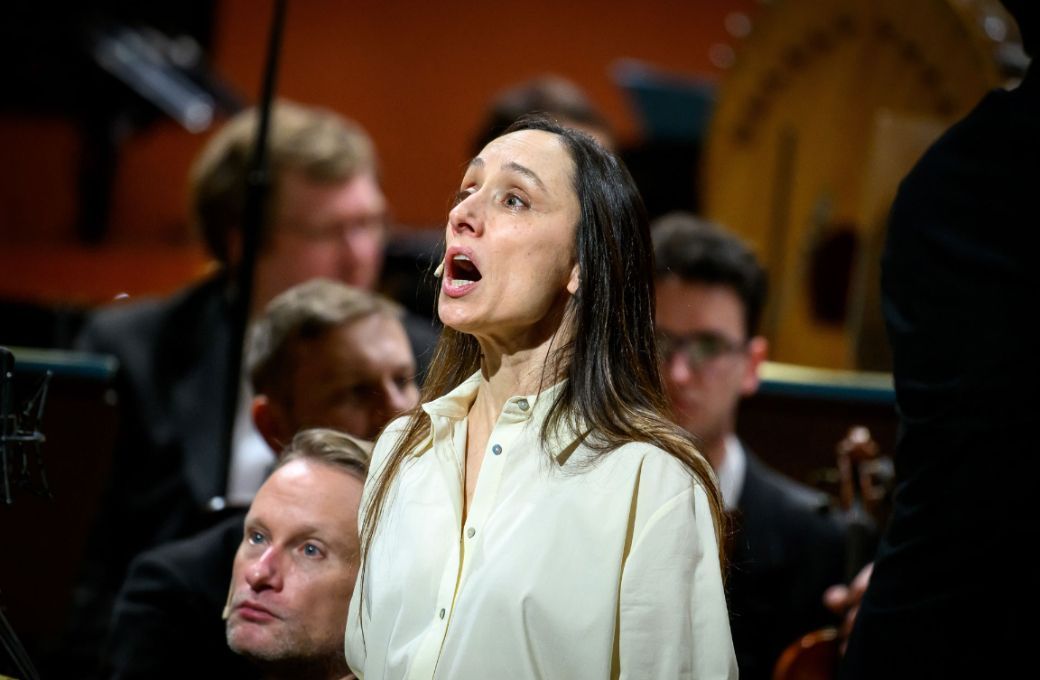When the Czech Philharmonic performed Arthur Honegger’s Jeanne d’Arc au bûcher (Joan of Arc at the Stake) for the first time in January 1970, it was more than just another oratorio. The concert marked the one-year anniversary of the death of Jan Palach, a Prague student who set himself on fire to protest the invasion of Czechoslovakia by Warsaw Pact troops. The Communist occupiers missed its significance, but locals did not, according to then-Dramaturg, Ivan Medek: “The sold-out concert had the character of a protest, because everyone knew what it was about.”

A contemporary reprise offered a vivid reminder that Honegger's mystère lyrique has lost none of its power or resonance in the intervening 55 years. In a riveting performance conducted by Lukáš Vasilek, fire was once again the dominant theme and through thread, in both razor-sharp work by the orchestra and blazing vocals from eight soloists and two choirs. Emotions ran so hot and high that Vasilek and French actress Audrey Bonnet, who portrayed Joan, could barely move when the final notes faded away.
Vasilek, the artistic director and choirmaster of the Prague Philharmonic Choir, showed himself to be equally adept with an orchestra, negotiating a complicated score with a keen sense of detail, color and balance. The music is a narrative in and of itself, providing not just support for the singers, but atmosphere, commentary, ironic asides – a kaleidoscope of sounds that Vasilek integrated brilliantly. The players were no less impressive, handling the constant changes in tone and dynamics with aplomb and nailing the unique pitches in Honegger’s unusual combination of triple saxophones, trumpets and trombones with an expanded woodwind section. Virtuoso work in the movement recounting Joan’s trial by beasts brought a pig, donkey and sheep to life with humorous finesse.
The electric vocals that are the trademark of the Prague Philharmonic Choir were on full display, particularly in the condemnations of Joan and the soaring entreaties to God, along with an added dimension of dark, simmering waves of doom to open the piece. The vocal fireworks that conclude the oratorio were given a fine counterbalance by the Prague Philharmonic Children’s Choir, which was gentle and endearing in prayers throughout, and positively transcendent in a final affirmation of Joan’s sacrifice.
Bonnet was for the most part underwhelming, portraying Joan as a frustrated waif bewildered by her fate. There was plenty of passion in her performance, but no nobility, robbing the character of appeal and impact. To be fair, the role is relatively restricted until the final movements, when Bonnet finally showed some range and flair. And her casual attire did nothing to invoke a heroic figure. Sébastian Dutrieux was far more convincing in the spoken role of Joan’s companion, Brother Dominic.
Among the supporting singers, the three women were standouts – soprano Veronika Rovná as St Marguerite, mezzo Anna Goryachova as St Catherine and soprano Susanne Bernhard as a lustrous Virgin Mary. As Porcus, the pig overseeing Joan’s trial, tenor Kyle van Schoonhoven stole the show from the male singers with a snappy, snooty performance, wielding his voice like a whip.
There was a long, almost awkward pause after the music stopped, with both Vasilek and Bonnet frozen in place. It was clear during the subsequent curtain calls that they were physically and emotionally drained, lending new meaning to the phrase “leaving it all on the stage”. Its shortcomings notwithstanding, this was a performance for the ages.


